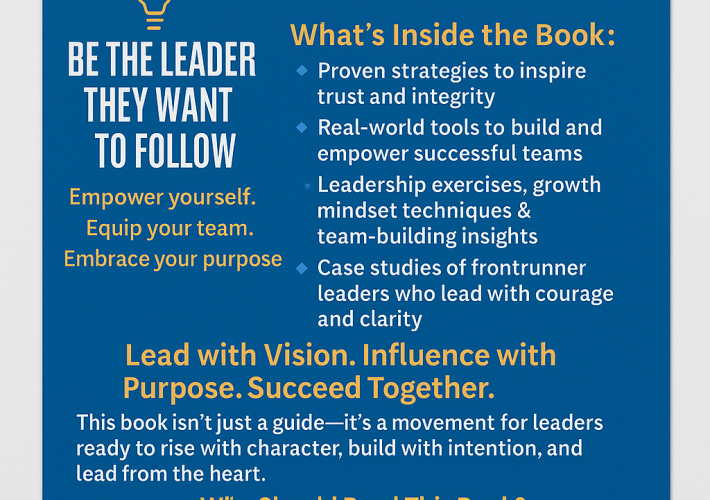How Would You Define Leadership For Yourself?
Leadership is a multifaceted concept that encompasses a variety of skills, traits, and behaviors. At its core, leadership is about influencing others to achieve common goals and inspiring them to strive for excellence. For some, leadership might be about taking charge during critical moments, while for others, it might be about nurturing and guiding a team consistently. How do you define leadership for yourself? Let’s delve deeper into the characteristics that define effective leadership and how you can embody these traits.
You Are a Boss or a Leader? The distinction between a boss and a leader is significant. While a boss may have the authority to direct and manage tasks, a leader inspires and motivates. According to Rowe (2007), Assigned Leadership comes from one’s position, whereas Emergent Leadership is about influencing others to achieve high goals.
Characteristics of a Leader
A true leader possesses a mix of soft and hard skills. Here are some essential characteristics:
- Visionary Thinking: A leader has a clear vision and communicates it effectively.
- Empathy: Understanding and sharing the feelings of others.
- Integrity: Being honest and having strong moral principles.
- Resilience: The ability to recover from setbacks.
- Decisiveness: Making decisions confidently and swiftly.
How do you rate yourself against these characteristics? How would your team describe your leadership style? Reflecting on these questions can provide insights into areas for improvement.
Characteristics of a Boss
While the terms “boss” and “leader” are often used interchangeably, they represent distinct approaches to management and leadership. Here are some key characteristics that typically define a boss:
Authority-Centric: A boss often relies on their position of authority to manage and direct their team. They expect compliance and obedience based on their formal role within the organization.
Directive Approach: Bosses tend to use a directive style of management, giving clear and specific instructions on what needs to be done and how it should be accomplished. They focus on the execution of tasks and meeting deadlines.
Task-Oriented: Bosses are typically task-oriented, prioritizing the completion of work and the achievement of short-term goals. They emphasize productivity and efficiency.
Control and Supervision: Maintaining control and close supervision over their team is a hallmark of a boss. They monitor progress closely and often check in on their team’s work to ensure it meets standards.
Top-Down Communication: Communication from a boss is usually top-down, meaning information flows from the boss to the subordinates. There is often less emphasis on two-way communication and feedback from team members.
Focus on Results: Bosses are often focused on the results and the bottom line. They prioritize the achievement of targets and objectives, sometimes at the expense of employee satisfaction and morale.
Formal Relationships: The relationship between a boss and their subordinates is often more formal. There is a clear distinction between roles, and interactions may lack the personal connection found in more collaborative environments.
Decision-Making Authority: A boss typically holds the decision-making authority within the team. They make the final calls on key issues and expect their decisions to be followed without much debate.
Performance Monitoring: Bosses place a strong emphasis on performance monitoring and evaluations. They regularly assess their team’s performance against set metrics and standards, providing feedback primarily to correct deviations from expected outcomes.
Problem-Solving: In a boss-centric approach, problem-solving is often handled by the boss themselves. They take charge of identifying issues and devising solutions, expecting their team to implement them accordingly.
Limited Delegation: Bosses may be less inclined to delegate significant responsibilities or decision-making power to their team members. They prefer to retain control over critical aspects of the work.
Authority-Based Motivation: Motivation under a boss tends to be more authority-based, relying on formal power and control rather than inspiration and personal influence. Rewards and punishments are used to drive performance.
Understanding these characteristics can help distinguish between a traditional boss and a transformational leader. While both roles are essential in different contexts, recognizing these traits can provide insights into how management styles impact team dynamics and organizational success.
Theories of Leadership
Leadership theories provide frameworks to understand how leadership emerges and develops. Here are three widely discussed theories:
- Trait Theory: Some individuals naturally possess traits that make them leaders. These traits include confidence, charisma, and decisiveness. While these traits can be inherent, they can also be developed over time.
- Great Events Theory: Significant events can bring out extraordinary leadership qualities in ordinary individuals. For example, during a crisis, someone might step up and lead effectively, even if they had not previously demonstrated such capabilities.
- Transformational Leadership Theory: This theory suggests that anyone can learn leadership skills through experience, training, and education. Transformational leaders inspire and motivate their followers to exceed their own expectations and capabilities.
Spiritual Aspects of Leadership: Leadership isn’t just about practical skills; it also involves spiritual and ethical dimensions. As highlighted in Colossians 3:23-25, leaders are encouraged to work heartily and with integrity, knowing that their reward comes from a higher purpose. Similarly, 1 Peter 5:2-3 emphasizes the importance of caring for those entrusted to you.
Total Leadership
Gaining Respect and Trust: A leader must earn the respect and trust of their followers. This involves being ethical, having a clear sense of direction, and consistently demonstrating honorable behavior. People follow leaders they respect and who have a clear vision of the future.
Self-Serving vs. Servant Leadership: Self-serving leaders often misuse their authority to look good at the expense of their workers. In contrast, servant leaders focus on the growth and well-being of their team. They build trust, foster collaboration, and encourage their team to achieve their full potential.
Building a Positive Outlook: A positive outlook can significantly impact your leadership effectiveness. By fostering connections and building a trusting attitude towards others, you can reduce tension and improve relationships within your team. A positive leader is more likely to inspire and motivate their team to achieve great things.
Practical Steps to Improve Your Leadership
Develop Emotional Intelligence
Emotional intelligence is crucial for effective leadership. It involves being aware of your own emotions, understanding the emotions of others, and managing emotional dynamics within your team. Leaders with high emotional intelligence are better at resolving conflicts, building strong relationships, and creating a positive work environment.
Encourage Continuous Learning: Great leaders are lifelong learners. They constantly seek out opportunities to expand their knowledge and improve their skills. Encourage your team to do the same by providing access to training and development resources.
Foster a Collaborative Environment: Collaboration is key to achieving organizational goals. Create an environment where team members feel comfortable sharing ideas and working together. This can lead to more innovative solutions and a stronger sense of community within your team.
Set Clear Goals and Expectations: Clear goals and expectations provide direction and purpose. Ensure that your team understands what is expected of them and how their work contributes to the overall mission of the organization. Regularly communicate progress and provide feedback to keep everyone on track.
Conclusion
Defining leadership for yourself involves a deep understanding of both your strengths and areas for improvement. By embodying the characteristics of effective leadership, adopting a positive outlook, and continuously striving to improve, you can inspire and motivate your team to achieve great things. Whether you naturally possess leadership traits or develop them through experience and training, the key is to lead with integrity, respect, vision, and a genuine concern for the well-being of your team.
By: Dr. Maria Pinto Barbosa #DrBarbosa WhatsApp (386)206-6325
Certified as School Board of Education / PHD-Doctor of Philosophy in Cristian Clinical Counseling
ACCEL-Holistic Life Coach / Founder-Director of ACCEL Educational Leadership
Specialized on Temperaments – Personalities
Pastor Christian Minister Clergy / Bachelor of Theology in Pastoral leadership and Certified EETAD Theology
Discover more from Dr Maria Barbosa
Subscribe to get the latest posts sent to your email.





